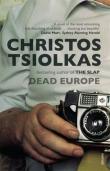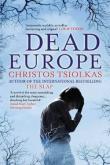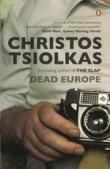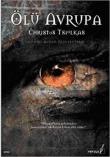AustLit
Latest Issues
AbstractHistoryArchive Description
Source: Manne, Robert. 'Dead Disturbing'. The Monthly. (June, 2005)
Adaptations
-
form
y
 Dead Europe
( dir. Tony Krawitz
)
Australia
:
See Saw Films
Porchlight Films
,
2012
Z1859546
2012
single work
film/TV
Dead Europe
( dir. Tony Krawitz
)
Australia
:
See Saw Films
Porchlight Films
,
2012
Z1859546
2012
single work
film/TV
'Isaac, a Greek Australian in his late 20s, spirals out of control when he's forced to confront his own family's cursed legacy on his first trip to Europe - with the continent's haunted past and troubled present pressing in on him.'
Source: Inside Film website
Notes
-
Dedication: For 'Mitsos' Litras and Dimitris Tsolkas, in gratitude.
-
Epigraph: To a saintly man
- So goes an Arab tale-
God said somewhat maliciously:
'Had I revealed to people
How great a sinner you are,
They could not praise you.'
'And I,' answered the pious one,
'Had I unveiled to them
How merciful you are,
They could not care for you.' (Czeslaw Milosz) -
The adaptation of Dead Europe began filming in Sydney in September, 2011.
Publication Details of Only Known VersionEarliest 2 Known Versions of
Other Formats
- Also sound recording.
Works about this Work
-
Christos Tsiolkas's Style
2021
single work
criticism
— Appears in: JASAL , vol. 21 no. 1 2021;'This article takes up a specific feature of Christos Tsiolkas's writing, his style. Focusing on Tsiolkas's fourth novel, The Slap, this article argues that Tsiolkas’s style is an inarticulate style: a style that does not always use the right word at the right moment, that employs language for narrative utility rather than its own sake, and that sporadically departs from standard usage and correctness in ways that do not appear artistically motivated. My argument is that The Slap is notable among contemporary fiction in that what I consider to be Tsiolkas’s worst sentences are the most revealing of his inclinations as a novelist. Consequently, I depart from what has become a standard formula in Tsiolkas's reception, that where Tsiolkas succeeds as a writer he succeeds in spite of his style. Finally, this article also contributes to recent debates about the purpose and vocabulary of Australian literary discussion: how critics debate the work of a prize-winning author, how criticism and praise operate in critical judgements, and the significance of style in evaluations of literature.' (Publication abstract)
-
Europe as Alternative Space in Contemporary Australian Fiction by Carey, Tsiolkas and Jones
2019
single work
criticism
— Appears in: Journal of the European Association for Studies of Australia , vol. 10 no. 2 2019;'This article investigates imaginings of Europe in contemporary Australian fiction in order to explore whether (traveling to) Europe provides alternative points of reference to discourses on nation, belonging, and identity beyond the (settler) postcolonial. The article sets out to compare recent works by Peter Carey, Christos Tsiolkas and Gail Jones who narrate Europe against a wide range of backgrounds, covering diverse diasporic, migratory and expatriate experiences, in order to explore the role of Europe as an alternative space, and of European modernities in particular, in the Australian literary imagination. Concentrating on Jack Maggs (1997), Dead Europe (2005) and A Guide to Berlin (2015), the article has a threefold focus: Firstly, it analyses the representation of European spaces and explores how the three novels draw attention to multiple modernities within and beyond Europe. Secondly, it demonstrates how all three novels, in their own way, reveal European modernities to be haunted by its other, i.e. death, superstition, ghosts, or the occult. Thirdly, these previous findings will be synthesized in order to determine how the three novels relate Europe to Australia. Do they challenge or perpetuate the protagonists’ desire for Europe as an ‘imaginary homeland’? Do references to Europe support the construction of national identity in the works under review, or do these references rather point to the emergence of multiple or transnational identities?'
Source: Abstract.
-
y
 Writing Belonging at the Millennium : Notes from the Field on Settler-Colonial Place
Bristol
Chicago
:
Intellect
,
2019
18882857
2019
multi chapter work
criticism
Writing Belonging at the Millennium : Notes from the Field on Settler-Colonial Place
Bristol
Chicago
:
Intellect
,
2019
18882857
2019
multi chapter work
criticism
'Writing Belonging at the Millennium brings together two pressing and interrelated matters: the global environmental impacts of post-industrial economies and the politics of place in settler-colonial societies. It focuses on Australia at the millennium, when the legacies of colonization intersected with intensifying environmental challenges in a climate of anxiety surrounding settler-colonial belonging. The question of what belonging means is central to the discussion of the unfolding politics of place in Australia and beyond.
'In this book, Emily Potter negotiates the meaning of belonging in a settler-colonial field and considers the role of literary texts in feeding and contesting these legacies and anxieties. Its intention is to interrogate the assumption that non-indigenous Australians' increasingly unsustainable environmental practices represent a failure on their part to adequately belong in the country. Writing Belonging at the Millennium explores the idea of unsettled non-indigenous belonging as context for the emergence of potentially decolonized relations with place in a time of heightened global environmental concern.'
Source: Publisher's blurb.
-
y
 Reckoning with the Past : Family Historiographies in Postcolonial Australian Literature
Abingdon
:
Routledge
,
2018
17218286
2018
single work
criticism
Reckoning with the Past : Family Historiographies in Postcolonial Australian Literature
Abingdon
:
Routledge
,
2018
17218286
2018
single work
criticism
'This is the first book to examine how Australian fiction writers draw on family histories to reckon with the nation's colonial past. Located at the intersection of literature, history, and sociology, it explores the relationships between family storytelling, memory, and postcolonial identity. With attention to the political potential of family histories, Reckoning with the Past argues that authors' often autobiographical works enable us to uncover, confront, and revise national mythologies. An important contribution to the emerging global conversation about multidirectional memory and the need to attend to the effects of colonisation, this book will appeal to an interdisciplinary field of scholarly readers. '
Source: Publisher's blurb.
-
Deaths That Wound : The Traumatic Potential of Ghost Stories
2016
single work
criticism
— Appears in: TEXT Special Issue Website Series , October no. 35 2016; 'Trauma presents any writer with difficulties. Trauma lays outside the realm of representation, by definition something that cannot be expressed and that lies beyond ordinary means of recollection and representation. This article examines the close relationship that exists between trauma and ghost fiction. It highlights the potential ghost fictions, as a form of writing about death, offer writers as translators of historical and social trauma. By reading ghost fiction in tandem with scholarship on trauma fiction and autobiographical trauma writing, the article demonstrates how ghost fiction both prefigures a narrative understanding of memory and history in trauma studies, dramatizes some of the processes and risks of first and second party engagement with trauma and offers a unique opportunity to approach, interrogate and alleviate trauma from the outside. In short, ghost fiction enables creative interventions in social and historical memory not by offering realist ‘precise data’, but by ‘speaking for the ones who did not return’.' (Publication abstract)
-
Unsettled By Europe's Dark Wasteland
2005
single work
review
— Appears in: The Weekend Australian , 28-29 May 2005; (p. 8-9)
— Review of Dead Europe 2005 single work novel -
A Taste of European Decay
2005
single work
review
— Appears in: The Age , 28 May 2005; (p. 4)
— Review of Dead Europe 2005 single work novel -
Dead Disturbing
2005
single work
review
— Appears in: The Monthly , June no. 2 2005; (p. 50-53)
— Review of Dead Europe 2005 single work novel -
Old World Order
2005
single work
review
— Appears in: The Bulletin , 14 June vol. 123 no. 6474 2005; (p. 68-69)
— Review of Dead Europe 2005 single work novel -
A Very Modern Ghost Story
2005
single work
review
— Appears in: Australian Book Review , June-July no. 272 2005; (p. 45)
— Review of Dead Europe 2005 single work novel -
European Vocation
2005
single work
column
— Appears in: The Sydney Morning Herald , 18-19 June 2005; (p. 22-23) -
Wrestling Demons
2005
single work
column
— Appears in: The Advertiser , 18 June 2005; (p. 11) -
A Fortunate Son
2005
single work
column
— Appears in: The Sunday Age , 3 July 2005; (p. 20) -
The Year's Work in Fiction
2005
single work
review
— Appears in: Westerly , November vol. 50 no. 2005; (p. 56-67) Shortlisted books for the 2004-2005 Miles Franklin Literary Award. -
The Spectres Haunting Dead Europe
2005
single work
criticism
— Appears in: Overland , Summer no. 181 2005; (p. 26-31)
Awards
- 2006 winner The Age Book of the Year Award — Fiction Prize
- 2006 shortlisted ASAL Awards — ALS Gold Medal
- 2006 shortlisted New South Wales Premier's Literary Awards — Christina Stead Prize for Fiction
- 2006 longlisted Miles Franklin Literary Award
- 2006 inaugural winner Melbourne Prize — Best Writing Award
- Europe,
- Melbourne, Victoria,
- 1900-1999







